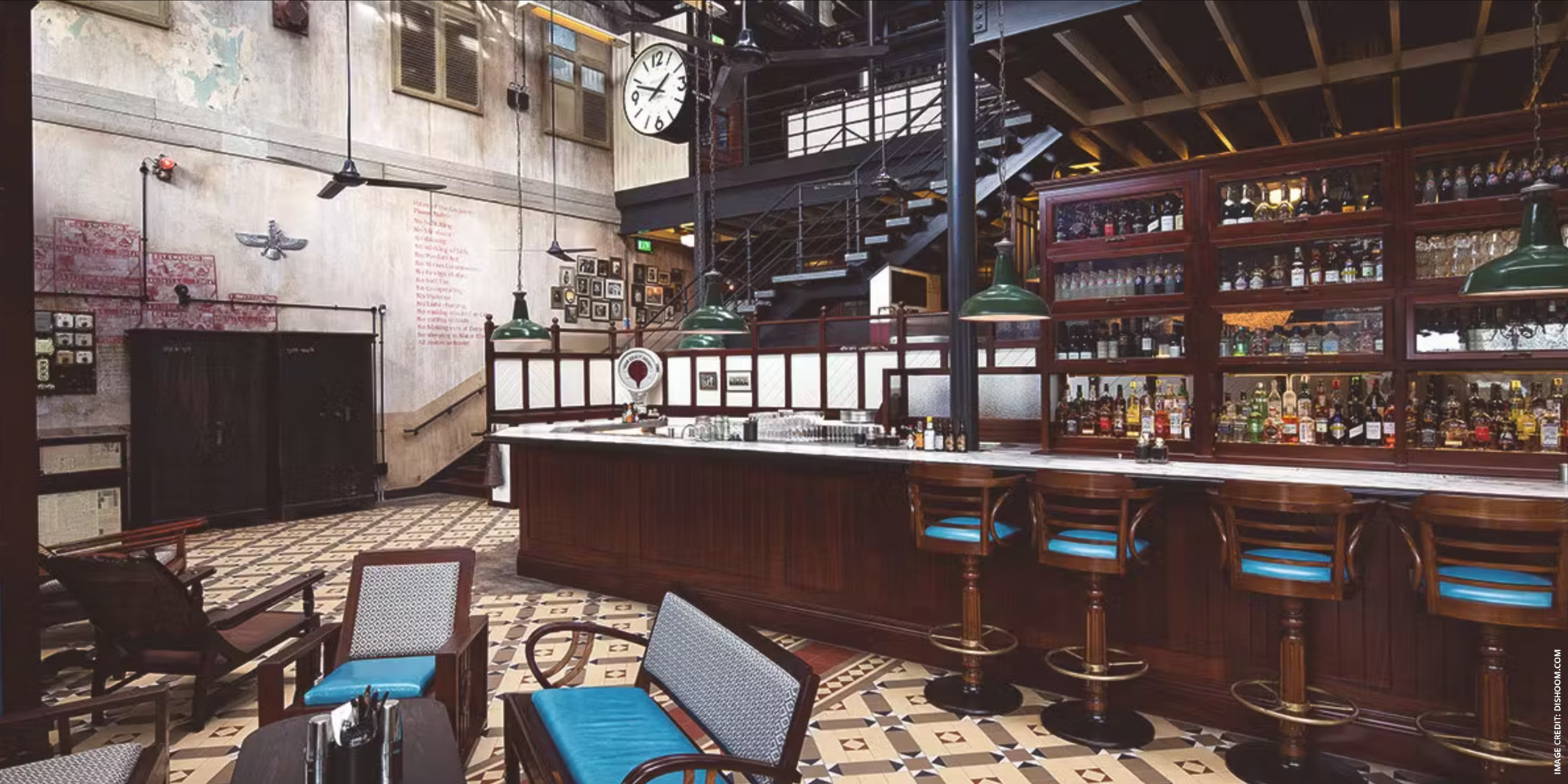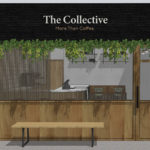From Bombay with Love is the delicious tagline of the distinguished restaurant Dishoom, that burst onto the London restaurant scene in 2010, opening in Covent Garden. Since then it has opened a further 8 locations, including ones in Manchester, Edinburgh and Birmingham. As we delve further into the Dishoom Restaurant brand story, you’ll see why their tagline is perfect for the now famous restaurant, and how impactful their whole brand and restaurant interior concept is.
Who’s behind the Dishoom concept?
There are four founders of Dishoom; Cousins Shamil and Kavi Thakrar, and brothers Adarsh and Amar Radia. The Thakrar’s grew up in the United Kingdom and enjoyed regular trips to India. Brothers Adarsh and Amar grew up in Kenya. It was a notice of a gap in the market between high-end expensive restaurants and curry houses that first got them thinking. Then a mutual love for Irani Cafe’s and authentic home-made Indian food that sparked the idea for the Dishoom restaurant concept.
Introducing Dishoom Restaurant – The concept
“Dishoom pays homage to the Irani café’s and the food of all Bombay.” Dishoom is arguably one of the most successful new restaurants to hit the London food scene, and if you visit one of their restaurants, you might have to queue, but once in, it’s easy to see why.
The word Dishoom is the sound of a bullet flying through the air or landing a punch in a Bollywood movie. Like the ‘Kapow’ of western movies.
Dishoom is so much more than an Indian restaurant though, it is an experience that transports you back to Bombay of old. The co-founders have spent a lot of their time visiting India, researching its rich history and being inspired by the special Irani cafés and their incredible legacy, and this shows not only in the brand positioning but also the restaurant interior design too.
Shamil Thakrar has said through multiple interviews that he felt that India has so much more to it than the very western cliches of cricket, Bollywood, palaces, tech and curry houses. They wanted to rebrand the reputation of India and show people it was cool and that everyone could find their place with the Dishoom restaurant brand.
The past lifetime of Irani cafés is incredibly poignant, and for the founders, it was important that they embedded the authentic feel and history into their restaurants. Prior to the partition of India and Pakistan in 1947, there was a lot of violence and conflict between religious groups, whether that was Muslims, Sikhs, Hindus or Christians, there was unrest that resulted in the death of millions. This meant that the groups would never mix with one another. Bombay was different though, geographically it wasn’t as affected with the same severity as other areas, by the issues that were ongoing. And their Irani cafés were the only places that welcomed everybody, the result was that their level of casualties during the violence pre-partition, were lower than other regions. This open-door policy meant that from table to table, there would be people of different religions all sitting soaking in the atmosphere, eating home-made authentic food, and listening to music.
This welcome to all, atmospheric experience is a building block in the Dishoom brand. The co-founders have revealed they have had billionaires sat at tables next to students and famous faces joining their queues. Yes, queues. Being a place that prides itself on being an open door for everyone and anyone, as the original Irani Café’s, you cannot make reservations, instead, you just turn up, and sometimes, that means you queue.
So how have Dishoom replicated the culture of Irani Café’s they were so inspired by?
The co-founders acknowledged that it was to be an immersive experience, one where you were transported back to 1940’s Bombay. Shamil Thakrar says that nothing is by accident. Whether it’s design aesthetics, music, food, or service, it is all very intentional towards that end goal of invoking the feeling of an experience bringing people together.
‘Deepen don’t dilute.’ Is a favoured ethos by founder Shamil. It is at their very core that expansion, and new openings would only happen if it was aligned with the brand and could deepen the brand experience, not dilute it. This is because it must be whole-heartedly authentic to deliver the experience they have designed.
Being able to deliver on this authenticity is something that has been key to the brands success. The co-founders have spent a lot of time in Bombay, soaking up the details and the atmosphere to be able to bring that back to their restaurants. This includes the music and finding members of old jazz and rock and roll bands that used to perform in the cafes in India to find out more about what it used to be like. They themselves often have live music on and Dishoom have their own playlists on Spotify and an album!
When in Bombay they walk the markets of street food, buying and sampling dishes that they can put their own spin on and create for their customers without losing the authentic flavours.
They also want to create their own spin on what they create. They open at 8am for breakfast, where they are offering their own version of a full cooked breakfast, breakfast naans, and classic offerings straight from Bombay.
The Dishoom co-founders are incredibly passionate and thorough in delivering on their brand strategy and experience, and so too are their staff. Each member of staff must go through a 50 page document that takes them through the history, the inspiration and how it comes to affect Dishoom and the important role the staff play in the Dishoom experience. This level of communication is what creates staff that work in alignment with the brand and its values.
Dishoom believe that “we are all at our happiest and best when we are whole-heartedly sharing ourselves and contributing to the world to the very best of our abilities.” This is something that they truly live and breathe. Shamil recalls asking his head-chef, who was fasting for Ramadan, what it was all about. Their chef, Naved Nasir, explained that it was about charity, and about depriving yourself so that you know what it’s like not to have things. As a result, they created an initiative that for every meal they served, they would donate a meal to hungry children. So far, they have donated over 700 million meals, across the UK and India.
Additionally, they host events based around religious festivals, such as Muslim festivals and Hindu festivals. They are active in encouraging everyone to go, not just those of that religion. At an Eid event they hosted, out of 1000 attendees, half were not Muslim. Instead, it was a host of people experiencing culture in a new way and coming together. This references the way the Irani Café’s too would bring people from different worlds together.
Themselves and their employees are naturally diverse. Shamil himself is Hindu. In Hinduism a Dharma (A small thread like bracelet,) signifies behaviours and values that set out a way of living. At Dishroom, their Dharma is intertwined with the Seva principle – act of selfless service. When celebrating Hindu festivals, they gift Dharma’s to their staff and their customers too, encouraging them to gift them to one another.
At Christmas they get involved with carol services and ensure they close early Christmas eve and remain closed until after boxing day, closing again on new year’s day and January 2nd. This is to ensure their staff all enjoy time off with their families.
It’s safe to say that Dishoom has grown impressively from its first restaurant as a small business, to now having 10 restaurants and over 900 staff. The co-founders are very firm in their brand culture remaining that of a small business though. Back in 2017 they were ranked number 37 in the Sunday Times top 100 places to work, number 20 in 2020, and in 2021, the 4th best company in the UK by the UKs Top 100 Best Companies.
Shamil Thakrar has a MBA business degree from Havard and has worked in consultancy. So when setting up Dishoom, he very much had a business model and template in mind, focused on profit and margins. They would negotiate costs of products and send staff home when it was quiet. It didn’t take long for him to realise that profits would only improve if they focused on culture; “After strategy, you have two levers; processes and culture. Culture is what you fall back on when no one is looking.” Shamil goes on to say that a big part of his role is defining culture, and then repeating it until he is blue in the face.
The driving success in managing their staff culture like a small business, despite their growth, is in their consistency and small actions:
- The co-founders have a management meeting every single week, rotating the restaurants they meet at. This means they visit each restaurant and see the staff at least once every 6 weeks. They say it’s important to know their staff and to remain present, despite their growth over multiple locations.
- Any member of staff that is employed for Dishoom for 5 years is taken to Bombay for an immersive 5-day tour of the city.
- The Dishoom Mela is their summer party – all restaurants shut to attend a festival-esque event put on by the co-founders for employees and their families. It includes music, fairground rides and more.
- All staff members can take off the first day of their children going to school, and a day off to volunteer with their chosen charity.
- Their pay and benefits package was rated as the 2nd best for companies in the UK.
In short, the co-founders have built an impressive business, both front of house and back of house. Dishoom is leading the way when it comes to brand storytelling, and letting the brand lead the businesses, showing that success comes from brand integrity and consumer aligned values.
If you haven’t already, perhaps it’s time to get yourself to Dishoom to sample their signature bacon naan or black dhal and soak up some of its iconic atmosphere that makes it so popular.
Are you losing out because you don’t have a brand strategy? You can download our FREE Brand Strategy Template and read our Ultimate Guide to get you started!
If you want to be guided by an expert, get in touch!






